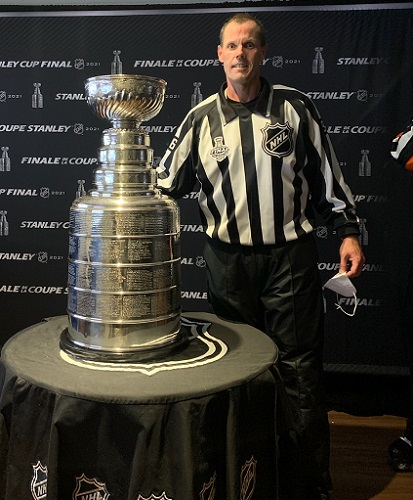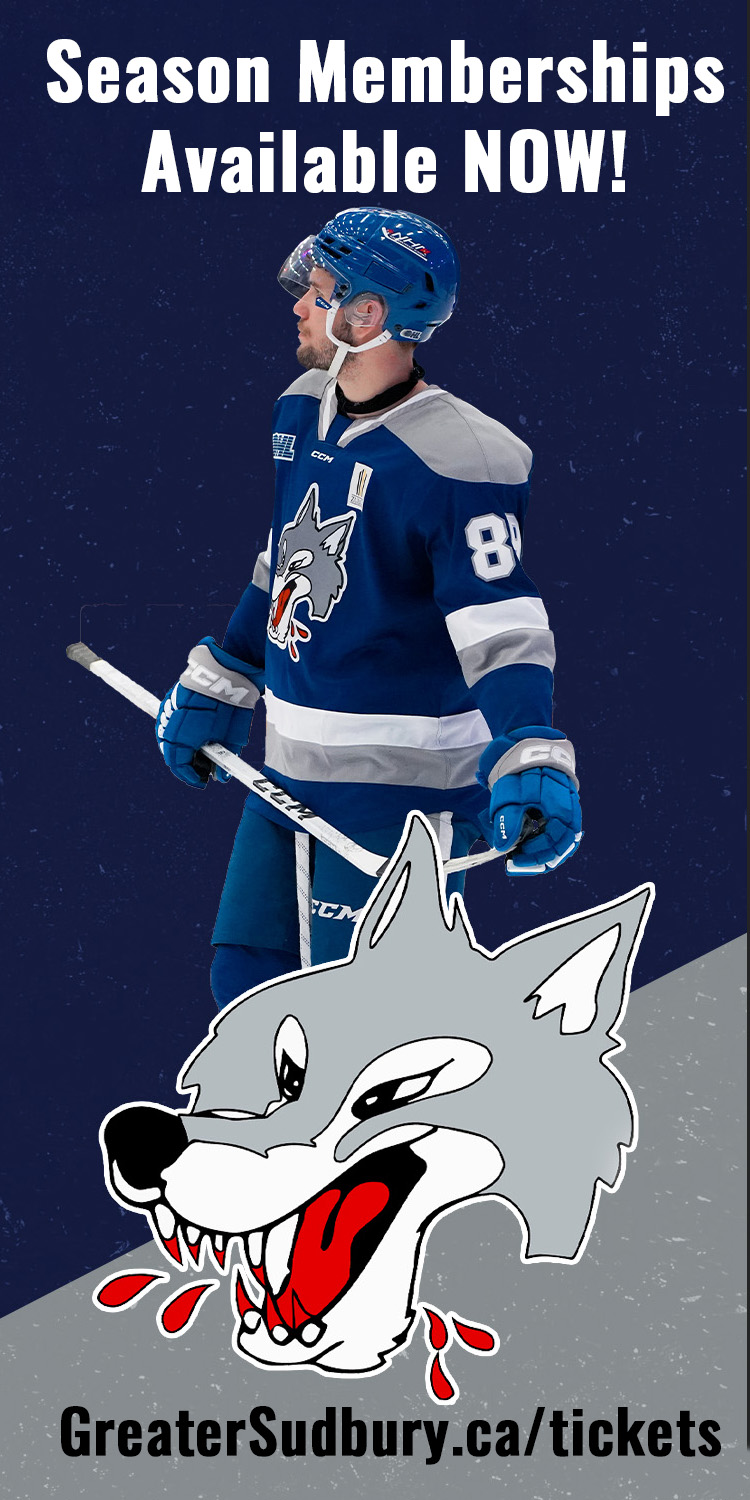
Many a member of the Tampa Bay Lightning will have their own particularly favourite memory of the 2021 Stanley Cup finals.
Copper Cliff native and long-time NHL linesman David Brisebois certainly will as well.
For the first time in the 22 season career of the local official, Brisebois would find himself standing proud at the playing of the national anthems in games two and four of the final – right alongside the starting lineup of the Tampa Bay Lightning and Montreal Canadiens.
“It was a really special moment, for sure,” said the 45 year old father of two who had enjoyed NHL post-season play on ten previous occasions, but never beyond the second round. “I worked game two in Tampa and you could tell this was something different. The hype around the finals is unreal.”
“It’s still just a hockey game, but the importance of it is magnified 1000%.”
With the league whittling their way down from 20 linesmen (of 34) who work round one, to 12 (QF) then eight (SF) and finally five for the games with the Cup on the line, Brisebois would need to draw on every last ounce of accumulated experience in earning the plum assignment.
“Every year, during the playoffs, I feel that I get more calm out there, more relaxed – I feel more confident,” he said. “It definitely helps when you’ve been around for a while and the players know you, have a bit of respect for you. The communication on faceoffs, how they deal with you on the faceoffs is huge.”
In so many ways, Brisebois could draw parallels to those very athletes that he helps oversee, starting with the mindset needed simply to be at his best.
“You don’t want to make any mistakes, but as soon as you go out there worrying about not making a mistake is when you get yourself in trouble,” he opined. “You have to go out there confident. It’s like a player playing afraid; he won’t be able to make the plays that he should be making.”
For as much as technology has lessened the grievous oversights, especially for the linesmen, the human element carries with it the reality that perfection is just the goal, not necessarily the reality.
“We’re always our own biggest critics,” said Brisebois. “We know, coming off the ice, whether we had a good game, a bad game, a mediocre game. You’re never going to have a perfect game – it’s impossible. But if you can’t be perfect, you want to be really, really good.”
Brisebois knows that when it comes to selecting the fortunate few who make that final cut within the officiating ranks, there is precious little to choose. He and his cohorts are there because they are the very best in the world – as hard as that might be for the inherently biased fan bases to understand. There is a pride factor that comes with establishing your reputation within your group.
“They would probably say that I don’t ever get too excited out there, too worked up,” noted the man who was one of the handful who worked only the Canadian division in regular season play. “I think that my partner and the referees can always count on me to help them if they’re in trouble.”
For as calm a demeanour as Brisebois maintains, there was an understandable elation the moment the email was received, naming him to games two and four of the final. “You start thinking about a lot of stuff,” he admitted.
“I was thinking about my dad getting me into officiating, thinking about my mother and my brother, my wife and kids, how much they’ve sacrificed – and about Dougie (former OHL linesman Doug Horner), how much he has done for me along the way.”
“You think about a lot of things when you’re out there,” Brisebois added. “You’ve made it to the pinnacle of your profession. This is why you’ve worked so hard every summer. This is where you want to be.”
The timing could not have been better, with Brisebois rewarded at the end of a highly unusual and somewhat challenging season. “This year was tough for everybody,” he said. “I think there were seven linesmen and seven referees who worked specifically in Canada.”
“The Canadian teams were great, but as teams and officials go, I’m sure they were tired of us and we were tired of them.”
The playoff schedule would see officiating crews working consistently as a unit of four, limiting opportunities for cross-contamination. While there might be something to be said for building up a degree of chemistry within the quartet, Brisebois will be fine with a return to the norm in 2021-2022.
“There are positives and negatives to both systems,” he said. “I think I would like to get back to travelling around, getting to see the different cities, and working with different guys.”
As to the incorporation of more and more technology into the world of hockey officiating, Brisebois understands both sides of the various debates, including the frustration that some fans feel regarding the minutia by which some offside calls are now being reversed.
“The reason they brought it (replay) in was to avoid the glaring offside being missed,” he acknowledged. “But once you bring replay in, then the bi-product of that is the argument of why not use it to make sure that we’re perfect.”
As to the notion of an “eye in the sky”, some form of upstairs assistance who are in direct contact with referees, Brisebois has concerns, unsure of the practicality of the system. “I don’t think they will ever have a referee upstairs calling a game, but who knows,” he said.
For now, his attention turns to looking to repeat.
“I took a week off and already, in the back of my mind, it’s time to start getting ready for next year,” he suggested. “We have to be ready for training camp in September, for fitness testing – that’s kind of the first thing. You don’t want to show up and not be ready to go for next season, especially after working the finals.”
And that’s a concern that David Brisebois does not mind tackling for the very first time in his NHL career.







